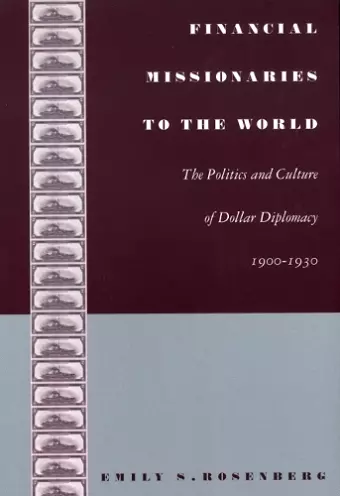Financial Missionaries to the World
The Politics and Culture of Dollar Diplomacy, 1900–1930
Format:Paperback
Publisher:Duke University Press
Published:2nd Jan '04
Currently unavailable, and unfortunately no date known when it will be back

This work on dollar diplomacy reshapes the historiography of foreign relations, offering an innovative melding of cultural, diplomatic, and gender history.
Combining diplomatic, economic, and cultural history, this title explains how private bank loans were extended to leverage acceptance of American financial advisers by foreign governments.Winner of the Society for Historians of American Foreign Relations Robert H. Ferrell Book Prize
Financial Missionaries to the World establishes the broad scope and significance of "dollar diplomacy"—the use of international lending and advising—to early-twentieth-century U.S. foreign policy. Combining diplomatic, economic, and cultural history, the distinguished historian Emily S. Rosenberg shows how private bank loans were extended to leverage the acceptance of American financial advisers by foreign governments. In an analysis striking in its relevance to contemporary debates over international loans, she reveals how a practice initially justified as a progressive means to extend “civilization” by promoting economic stability and progress became embroiled in controversy. Vocal critics at home and abroad charged that American loans and financial oversight constituted a new imperialism that fostered exploitation of less powerful nations. By the mid-1920s, Rosenberg explains, even early supporters of dollar diplomacy worried that by facilitating excessive borrowing, the practice might induce the very instability and default that it supposedly worked against.
"[A] major and superb contribution to the history of U.S. foreign relations. . . . [Emily S. Rosenberg] has opened up a whole new research field in international history."—Anders Stephanson, Journal of American History
"[A] landmark in the historiography of American foreign relations."—Melvyn P. Leffler, author of A Preponderence of Power: National Security, the Truman Administration, and the Cold War
"Fascinating."—Christopher Clark, Times Literary Supplement
"Fascinating." Christopher Clark, Times Literary Supplement "[A] major and superb contribution to the history of U.S. foreign relations ... [Rosenberg] has opened up a whole new research field in international history." Anders Stephanson, Journal of American History "[A] landmark in the historiography of American foreign relations." Melvyn P. Leffler, author of A Preponderence of Power: National Security, the Truman Administration, and the Cold War "In an analysis that is relevant to contemporary debates over international loans, she reveals how a practice initially justified as a progressive means to extend 'civilization' by promoting economic progress became embroiled in controversy."--Macalester Today "This is an impressive scholarly work that will appeal to many interested in economic and political diplomacy with a cultural dimension."-- Alan P. Dobson, Journal of American Studies "[F]or readers of the Journal of Interdisciplinary History, the book's most interesting features are probably its uses of cultural analysis to enhance our understanding of policy history... The volume can still be seen as timely."-- Ellis W. Hawley, Journal of Interdisciplinary History "Rosenberg's book is well-written and accessible to advanced undergraduate students. The book is well suited for supplementary reading in courses dealing with American economic and diplomatic history and it can serve as an excellent example of the "new" postmodern diplomatic history in courses emphasizing historiography."--Jerald Combs, The History Teacher
ISBN: 9780822332190
Dimensions: unknown
Weight: 708g
352 pages